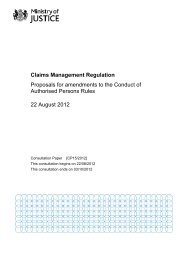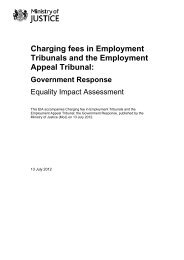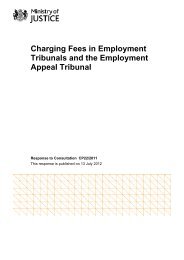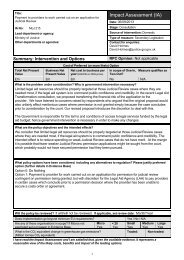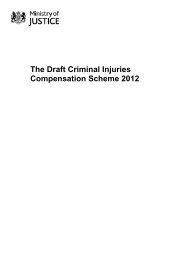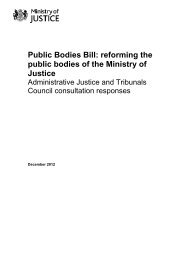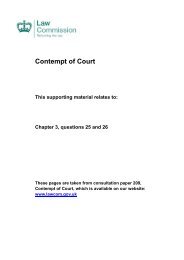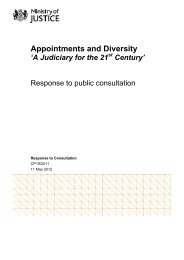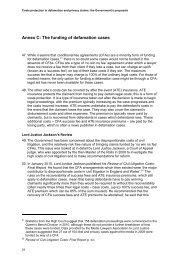Proposed reforms to attachment of earnings orders - Ministry of Justice
Proposed reforms to attachment of earnings orders - Ministry of Justice
Proposed reforms to attachment of earnings orders - Ministry of Justice
Create successful ePaper yourself
Turn your PDF publications into a flip-book with our unique Google optimized e-Paper software.
in relation <strong>to</strong> unpaid business, the credi<strong>to</strong>r might be a small firm and the deb<strong>to</strong>r might be a<br />
wealthy individual.<br />
Equity and fairness benefits<br />
2. 42 The proposals are expected <strong>to</strong> raise equity and fairness, as the original judgment is assumed <strong>to</strong><br />
be fair hence the quicker, more effective and more complete implementation <strong>of</strong> this judgment<br />
should improve fairness.<br />
Wider social and economic benefits<br />
2. 43 The proposals may generate wider social and economic benefits associated with the improved<br />
functioning <strong>of</strong> markets stemming from greater contractual certainty and enforceability.<br />
Option 1: Summary <strong>of</strong> key assumptions<br />
2. 44 The following key assumptions apply <strong>to</strong> Option 1:<br />
- The volume <strong>of</strong> cases is assumed <strong>to</strong> remain the same. Given the benefits <strong>to</strong> credi<strong>to</strong>rs,<br />
however, it is possible that case volumes might rise.<br />
- Court fees are assumed <strong>to</strong> remain the same. The reduction in court costs per case is<br />
assumed <strong>to</strong> lead <strong>to</strong> a reduction in the case backlog and hence in case waiting times. As a<br />
result overall court cost recovery would not be affected.<br />
- Court capacity (including staff and estate) is assumed not <strong>to</strong> be affected by these<br />
proposals.<br />
- Employer fees are assumed <strong>to</strong> remain the same per transaction.<br />
- Bailiffs and legal pr<strong>of</strong>essions are assumed <strong>to</strong> incur one-<strong>of</strong>f adjustment costs from their<br />
changing pattern <strong>of</strong> demand but are assumed <strong>to</strong> incur no change in ongoing costs or<br />
income once they have adjusted <strong>to</strong> undertaking less AEO business and more other<br />
business.<br />
- Where a deb<strong>to</strong>r requests a review <strong>of</strong> the fixed table deductions these cases are assumed <strong>to</strong><br />
exhibit the same characteristics as cases under existing arrangements. In effect the<br />
volume <strong>of</strong> cases subject <strong>to</strong> the new arrangements reduces by the volume <strong>of</strong> cases subject<br />
<strong>to</strong> a review.<br />
- We have assumed that the overall impact on legal aid, if any, is unlikely <strong>to</strong> be significant<br />
Option 2: To introduce a means <strong>of</strong> finding the deb<strong>to</strong>r’s employer in <strong>attachment</strong> <strong>of</strong><br />
<strong>earnings</strong> cases (TCE Act ’07 – Section 92)<br />
Description<br />
2. 45 Under the current system, employment details can only be obtained from the deb<strong>to</strong>r. There are<br />
no powers <strong>to</strong> obtain this information from other parties who may hold it.<br />
2. 46 If a deb<strong>to</strong>r changes employment and fails <strong>to</strong> notify the court <strong>of</strong> the new employer’s details the<br />
AEO fails, and recovery <strong>of</strong> the debt ceases. The credi<strong>to</strong>r is therefore required provide the court<br />
with information <strong>of</strong> the deb<strong>to</strong>r’s new employer if the AEO is <strong>to</strong> continue. It may be that a new<br />
order <strong>to</strong> obtain information is required <strong>to</strong> do this. If the Government does not amend the AEO<br />
process, credi<strong>to</strong>rs would continue <strong>to</strong> suffer undue delay with recovery <strong>of</strong> judgment debts by AEO.<br />
2. 47 The opening <strong>of</strong> an information gateway between the relevant court and HMRC should enable<br />
failed AEOs <strong>to</strong> be redirected <strong>to</strong> the current employer. The policy should ensure fewer AEOs<br />
would fail due <strong>to</strong> the deb<strong>to</strong>r failing in their responsibilities.<br />
2. 48 HMRC would only be approached if the deb<strong>to</strong>r has failed <strong>to</strong> provide the court with new<br />
employment details when, and if, they change employment whilst an order is in place. Provisions<br />
in the TCE Act 2007 allow information gateways <strong>to</strong> be opened for all types <strong>of</strong> AEOs covered by<br />
12



